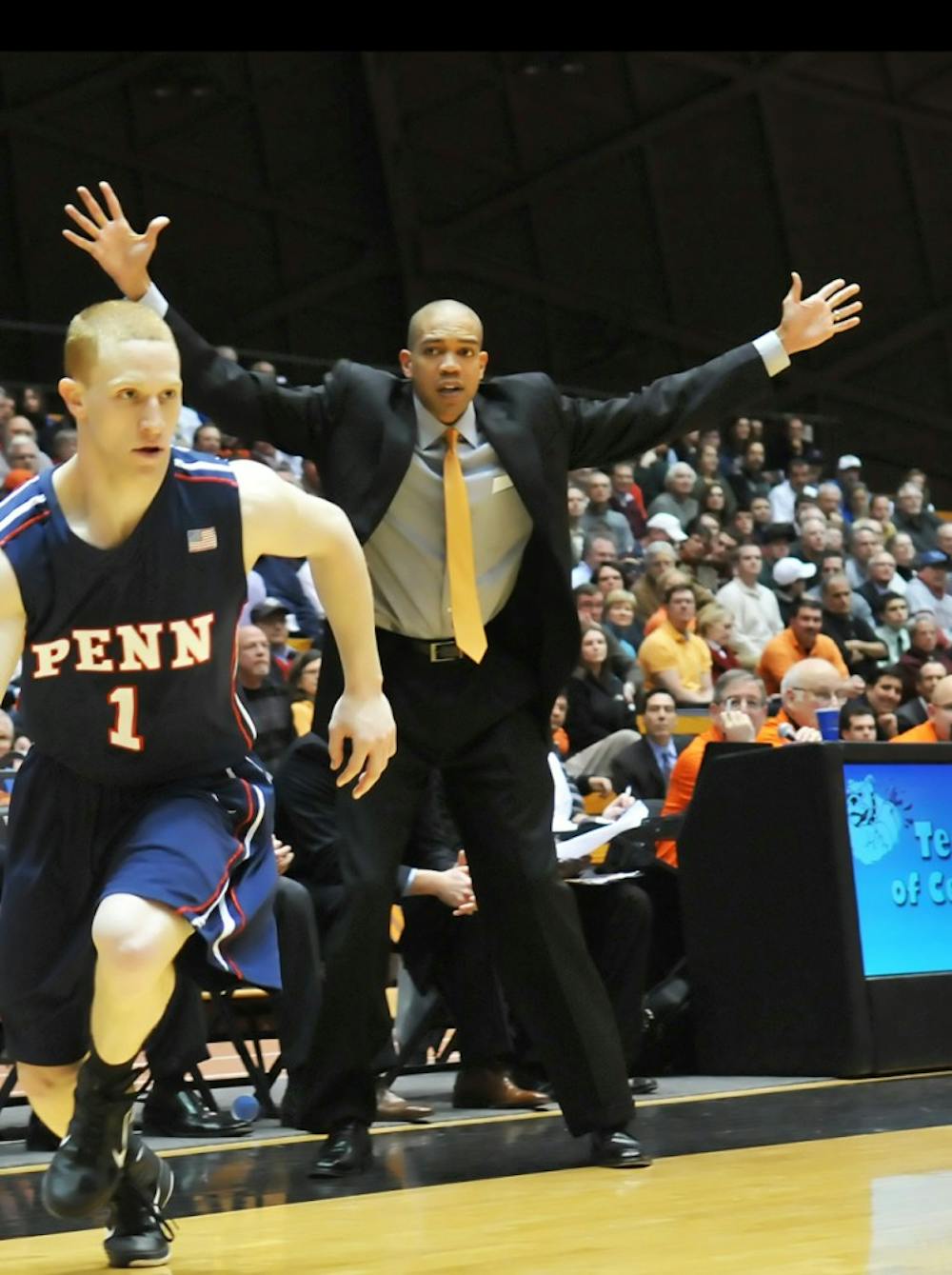When Princeton’s Dan Mavradies hit Douglas Davis in the far court off an inbounds pass, time slowed down.
Davis, then a junior for the Tigers, dribbled right, shook off Harvard guard Oliver McNally and nailed a 17-foot, off-balance shot at the buzzer.
Ten months ago, Davis’ shot in the one-game Ivy playoff returned Princeton to the NCAA tournament for the first time since 2004. It marked the culmination of four years of frustration for Princeton head man Sydney Johnson, who cried as he hugged his players.
He had conquered the Ivy League.
Yet three weeks later, he stunned the Tigers faithful when he left for Fairfield. His former teammate, Mitch Henderson, was hired as his replacement.
- * *
The story of Princeton coaching follows a familiar path, born from Pete Carril, who is arguably the most successful coach in Ivy basketball history and the founder of the ‘Princeton Offense.’
“For the most part, the nucleus of [Johnson’s offense] was similar to what coach Carill ran,” former Penn player and current coach Jerome Allen said of his counterpart’s system.
Today the record book is littered with marks from Carill. From his 29 years as a head coach to his 13 Ivy championships to his 514 overall victories — which dwarf his next-closest competitor, Fran Dunphy, who had 310 while coaching the Quakers — Carril’s most important contribution was his recognition of talent.
In his last few years as coach, he would find two men with divergent paths who have shaped the current Princeton program.
But even for all its success, the 1996 season, Carril’s last at the helm, marked a turning point for Princeton. Led by the second-year junior captain Johnson, the Tigers emerged from the shadow of the Allen-less Quakers.
That year, Johnson led Princeton to an NCAA first-round win over UCLA. The next year he won the 1997 Ivy League Player of the Year while Henderson played second fiddle.
Johnson, the favorite son, returned to the program in 2007. But in his first year, the team hit a trough, going 6-23.
Never one to lose hope, he instilled in his team a defensive instinct. The Tigers steadily improved before breaking out last year in that March 12 playoff against Harvard to capture the Ivy’s automatic NCAA tournament bid.
Yet on April 4, Johnson announced his resignation and decision to join Fairfield, a Division I school in the Metro Atlantic Athletic Conference that many saw as a step down in prestige and national visibility.
Penn assistant coach Dan Leibovitz, who left a head coaching position at Hartford in 2010 to work under Allen, admitted he was a little surprised at Johnson’s decision.
“It’s up to each coach to make what decision is best for him and it’s not always for all of us to understand,” he said. “Fairfield is a great program with a lot to offer, as is Princeton, but everybody’s different.”
- * *
In came Henderson, a gifted former athlete, who has relished the opportunity to return to his alma mater. But Henderson differs from Johnson in more than his style, said former Princeton coach Bill Carmody.
“He’s a very thoughtful guy who knows the game inside out and is a very hard worker,” he said.
Carmody, who now coaches at Northwestern, replaced Carril after the legend left Princeton for the NBA after the 1995-96 season. He coached a 1996-97 team with Johnson and Henderson and even gave Henderson his first coaching job in 2000.
“With Princeton, you’re talking about some degree of continuity,” Leibovitz said. “Mitch was with Carmody for a number of years so some things defensively are different. On the offensive end, it’s a little bit more strict ‘Princeton’ in the way Pete Carill would run.”
Even with the rise of Harvard, Henderson’s squad is still a threat. Today’s Princeton team is reminiscent of Carmody’s second year, which starred a balanced lineup and Henderson as the spark. With the exception of junior forward Ian Hummer, no Tigers player averages more than 15 points per game.
Princeton has been no pushover this year, either. The Orange and Black have defeated Rutgers and Florida State on the road; however, they dropped their first Ivy game against Cornell two weeks ago.
Nevertheless, Princeton must turn to a new son to help return it to the promised land.
“We sort of look at last year’s team as ancient history,” Henderson said. “This is a new team with a new group.
“We’ve had to try and find our own edge. We know the league is very good, but when you’re on the road it’s especially tough, and the mentality is to play for the moment.”
This article has been updated from a prior version to reflect the correct conference of Fairfield.



